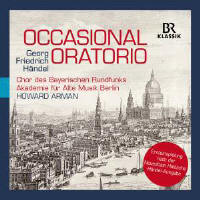Texte paru dans: / Appeared in: |
|
|
Outil de traduction (Très approximatif) |
|
|
Reviewer:
David Vickers This Munich broadcast is only the second commercial recording of the work. Robert King’s polished account employed five soloists and incorporated variants from Handel’s later performances, whereas Howard Arman mostly adheres to the first performance version and uses just three soloists (as Handel did in February 1746). His unerring pacing and astute shaping of details are realised impeccably by the Akademie für Alte Musik Berlin: trumpets, horns and timpani drive the splendid Overture with a confident swagger (Handel reused it three years later in the Fireworks Music). Julia Doyle sings with quicksilver suppleness, stylistic acumen and immaculate communication of the text (‘Fly from the threat’ning vengeance, fly’ is unfamiliar fantastic music that Handel based on an addition to the 1745 revival of Samson). Likewise, Peter Harvey’s diction, vocal suavity and persuasive authority are all spot-on. Ben Johnson’s perfect enunciation, husky timbre and fulsome projection remind me of Robert Tear. The Bavarian Radio Chorus always have plenty of discipline and articulacy, with only rare hints of Teutonic vowels. They sing with robust muscle in bellicose music, although one of their finest moments is the lovely choral refrain to the gently consoling ‘Be wise at length’ (the first half is sung beautifully by Doyle and features rapturous cello obbligato); the chorus develops animatedly into the sombre message that averse kings will be bruised by the iron sceptre, and shall perish like scattered sheep. Another extraordinary set piece is the verse-anthem-style ‘To God, our strength, sing loud and clear’, which starts with Harvey’s eloquent introduction paired with trumpet and oboe and concludes with a radiant choral outburst alluding cheerfully to timbrel, harp and psaltery. In Part 3 several key numbers from Israel in Egypt are transformed from rejoicing at liberation from Pharaoh’s tyranny into an expression of optimism against the Jacobite threat. The oratorio ends with an abridged parody of Zadok the Priest, which nearly 20 years earlier had accompanied George II’s sacred anointing as the legitimate king during his coronation service. There are inevitably a few infelicitous imperfections in this unfiltered live recording but the all‑round excellent performance confirms that even the rarest of Handel’s works contain unique stimulations. |
|




